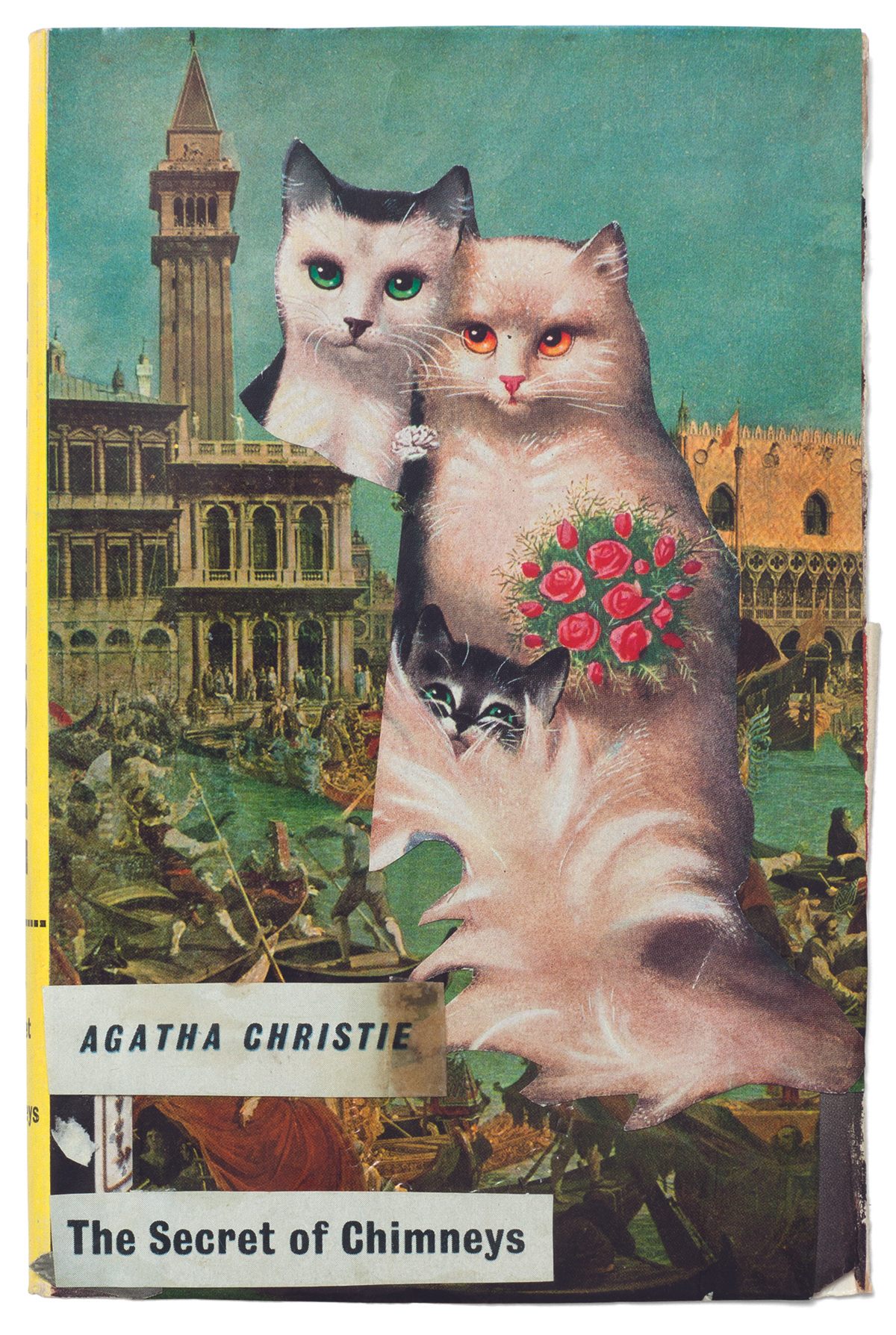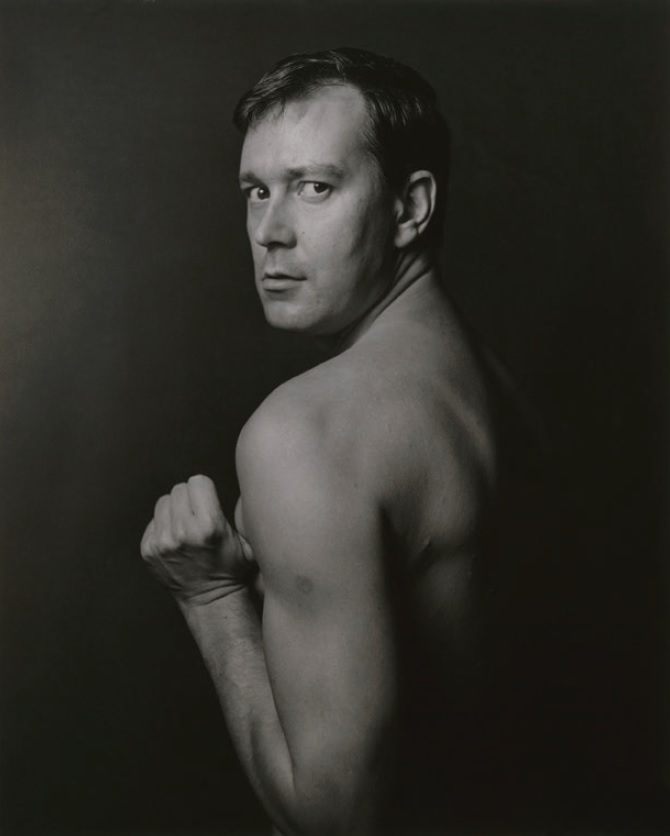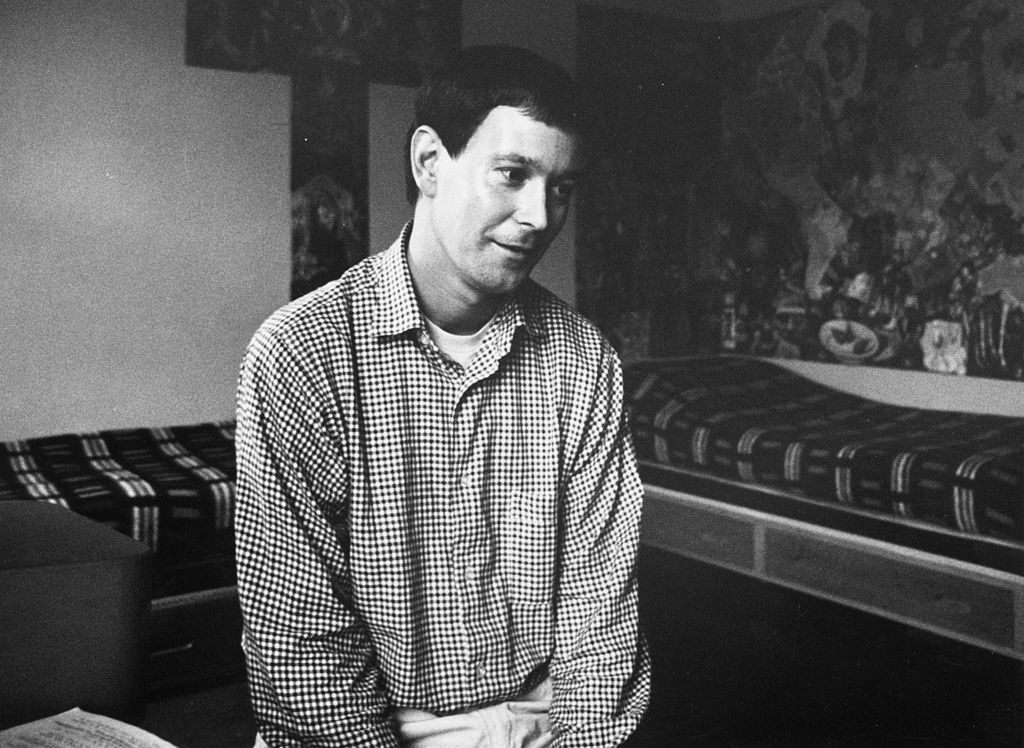The Strange, Sad Story of Joe Orton, His Lover, and 72 Stolen Library Books
After being imprisoned for a reading-related prank, the couple never recovered.
Police came to the door of Joe Orton, the man who would one day be one of the most famous playwrights in the United Kingdom, and his partner Kenneth Halliwell’s one-bedroom apartment at 9 a.m. on 28 April, 1962. It was a Saturday, the cooling end of the first warm week of the year, and the men had been up for hours, customarily getting up with the sunrise.
“We are police officers,” one said, “and I have a warrant to search your flat as I have reason to believe you have a number of stolen library books.” Orton replied: “Oh dear.”
A search warrant might seem excessive for library book hoarding—but Halliwell and Orton were no ordinary library pilferers. For over two years, Orton and Halliwell had been smuggling books out of their local libraries, the magnificent Art Nouveau Islington Central Library on London’s Holloway Road and nearby red-brick Essex Road Library—and then returning them.
Orton hid books in a satchel; Halliwell, six-and-a-half years older, used a gas mask case. They would take them home, redo their covers and dust-jackets, and then slip them back onto the shelves.
Sometimes, these alterations were obscene: a reader scanning a relatively tame Dorothy Sayers whodunit would find themselves confronted with a mystery even before they opened the book. The blurb now described some missing knickers and a seven-inch phallus, and concluded: “READ THIS BEHIND CLOSED DOORS! And have a good s*** while you are reading!” Meanwhile, the collected plays of Emlyn Williams, a Welsh dramatist, suddenly included “Knickers Must Fall,” “Olivia Prude,” “Up The Front,” and “Up The Back.”

The collages on the covers were no less subdued, and often overtly queer. On the cover of a book of John Betjeman poetry, a middle-aged man glowers in scanty black briefs. His body is covered entirely in tattoos. A now mostly forgotten romance novel, Queen’s Favourite, was redone with two men wrestling, naked to their navels.
Years later, once he’d become a famous playwright, Orton recalled: “I used to stand in corners after I’d smuggled the doctored books back into the library and then watch people read them. It was very funny, very interesting.”
At that time, Orton and Halliwell were nobodies: having graduated from the Royal Academy of Dramatic Arts, where they met, they had vacillated between short stretches of employment and living off unemployment benefits and the money Halliwell had been left by his parents.
Orton moved in with Halliwell barely three weeks after meeting him, in 1951. His diary entries for the first three days that they lived together are a single word each: “Well!”; “Well!!”, “Well!!!”.
Cloistered in the one-bedroom apartment, with its two single beds, they lived below a collage Halliwell had made from thousands of stolen pictures. Another 1,650-odd pictures were stashed around the apartment, ready to be put to use. Mythical beasts jostled for space with tabloid headlines and Renaissance high art: a grotesque ape-horse hybrid wore a map of Australia as its tutu.
The two spent every moment together, reading, writing, and living cheaply off brown bread and baked beans. Halliwell was older, middle-class and better educated; Orton his handsome young protégé, given the foundations of a classical education from the confines of their apartment, with its yellow-and-pink checkered ceiling. They shunned electric light to save money, sometimes going to bed at 9:30pm, and lived a puritanical, even hermetic, life.
They had been lovers, friends and co-conspirators for over a decade when they began doctoring the library books, using stolen pictures and their Adler Tippa typewriter.

Other covers showed a monkey, gazing astonishedly from the middle of a flower, on the Collins Guide to Roses, and giant cats on an Agatha Christie novel. On the cover of Shakespeare’s Henry VIII, the king, who was the first person to introduce a law in England criminalizing sodomy and making it punishable by death, has had his arms cut off at the elbow, while his army swarms away from him. “A challenge to his authority,” writes Emma Parker, of the University of Leicester, “constitutes an act of queer as well as class protest.”
Some celebrated same-sex desire in subtle ways—on the cover of Othello, Othello looks past the naked Desdemona, whose hand hovers suggestively above her crotch. Behind him a man points an arrow at his backside. “The columns, Othello’s long sword and [a long staff] render the image emphatically phallic,” says Parker.
These covers had a message that went beyond scurrilous vandalism or, as they would later be called in court, “malicious damage.” Unbeknown to Orton and Halliwell, a full-scale plot to bring them down had been afoot for months.

Readers, distressed or concerned, had begun to complain to the library. The branch was small and, as a librarian later noted in the Library Association Record write-up, “it was possible to observe individual readers more closely and to notice which possible culprits had been in the library before ‘finds’ were made.” The head librarian’s attention quickly fell on Orton and Halliwell, who were always together and shared an address.
At this point, the investigation had spilled out across the borough. Police suggested disguising staff from other library departments, who would not be recognized, as browsing readers, in the hope that they might catch Halliwell and Orton red-handed replacing books on the shelves. “After several weeks of unproductive observation,” chief librarian Alexander Connell wrote, “we contrived to obtain a sample of typewritten matter.”
Sidney Porrett, the Islington Borough Council legal clerk, had been given the responsibility of doing so. “I had to catch those two monkeys,” he later said. “I had to get results.” It seems likely that Porrett found something ‘queer’ in the case—in the symbiotic relationship between the two men; in the obscenities on the covers; even in the way Orton and Halliwell sought to be disruptive. Whatever it was, Porrett said at the time: “They were a couple of darlings, make no mistake.”

This homophobia fuelled an ingenious and cruel campaign, which began with a falsified letter, written in bureaucratic legalese and addressed to Halliwell. It urged him to reclaim a car apparently in his name.
If Porrett had hoped to aggravate him, he succeeded: Halliwell replied, “Dear sir, I should like to know who provided you with this mysterious information? Whoever they are, they must be a liar or a moron: probably both.” The letter was signed, triumphantly, beneath the salutation: “Yours contemptuously.”
The Adler Tippa had betrayed them. The typewriter’s particular fingerprint, its typeface and idiosyncrasies, matched the doctored dust jackets. After 18 months, the library finally had enough evidence to act. “Suspicion became certainty,” noted Connell.
The Metropolitan Borough of Islington sued Orton and Halliwell for damages: 72 books stolen and many more “mutilated.” The total damage was estimated to be £450—over $12,000 today.
Halliwell and Orton were sentenced initially to six months’ jail time, an unusually savage sentence that reflected the apparent shock of the magistrate, Harold Surge. “Those who think they may be clever enough to write criticisms in other people’s books, public library books, or to deface them or ruin them in this way,” should understand it was “disastrous,” he said in court. What they had done amounted to “sheer malice” toward other library-users.

Orton felt there was another reason for the severity of the sentence. On holiday years later, he told friends “it was really because we were queer.”
In court, their relationship wasn’t discussed. Newspapers described them as friends or roommates. Porrett describes them with malice, even derision: Orton “an overgrown schoolboy who was trying to draw attention to himself,” Halliwell “the dangerous type … Both looked like a couple of silly boys lost.” A probation officer, Stanley Ratcliffe, did observe “there was obviously a very strong emotional relationship between the two.”
But why did they do it at all? Orton would later suggest that it was in protest against libraries and librarians more generally. “I was enraged that there were so many rubbishy novels and rubbishy books. … Libraries might as well not exist.” An early novel co-written by Orton and Halliwell suggests another alternative. In The Boy Hairdresser, one character describes his own library transgressions: “We’re public benefactors in a way. We steal—the shops order more—the publishers are pleased—everyone is happy. We finance literature.”
These more political aspirations seemed to be lost on the court. Ratcliffe claimed it was merely the action of a couple of “frustrated actors and authors,” jealous of the success of others.
Stanley Porrett didn’t think six months in prison was a sufficient punishment for the men’s crimes. On their release in September, he threatened them with a charging order for the remaining £62 of damages they’d not yet paid. This would have given him power of sale over their mortgaged apartment to meet the unsettled debt.
Here too, Porrett’s homophobia seethes beneath the surface: “I wanted to let them know that I was still governor in this matter. I was still that much on top … They paid up like little darlings. I left them financially pretty rocky.”
The £6 a month Orton and Halliwell paid to this came out of their benefits—around a quarter of their income. For a comparatively mild crime, Halliwell wrote to Porrett in December 1962, they had lost their jobs, gone on benefits, spent six months in prison, and “paid practically all our pathetically small bank accounts.”
“Justice has certainly been done,” he wrote. “Some people might think, perhaps, even a little bit more than justice.”
Within a year, Halliwell had tried to slit his wrists.
Orton, on the other hand, channeled his rage into his art, and began pumping out plays. “[Prison] affected my attitude towards society,” he said, later. “Before I had been vaguely conscious of something rotten somewhere, prison crystallised this.” First, a radio play for the BBC—then plays performed around London, which attracted the attention and praise of British dramatist Terence Rattigan. Rapidly, he became well known and then quite famous, mingling with celebrities and asked to write a script for a Beatles film.
Halliwell became more introspective, sinking further into misery. They fought bitterly—over Orton’s friends, who didn’t understand the pair’s bond, and household expenses. Orton wrote in his diary: “I said: ‘Are you going to stand in front of the mirror all day?’ He said, ‘I’ve been washing your fucking underpants! That’s why I’ve been at the sink!’”

Sexually, there were other challenges—Orton had a predilection for “cottaging,” or sexual encounters with strangers in public bathrooms. He also had a fondness for teenage boys: in 1967, the two men travelled to Tangier, Morocco, where male prostitution, often of very young men, was common. That year, homosexual acts were decriminalized, though Orton commented to a friend: “It’s only legal over twenty-one … I like boys of fifteen.”
Halliwell was suicidal, popping “purple hearts,” a combined amphetamine-barbiturate marketed as an antidepressant to tired housewives. He complained to Orton of tightness in his chest, likely caused by anxiety, and lashed out at him in front of other people. Friends of Orton’s later said he wanted to leave Halliwell and had met someone else.
On the morning of August 9, 1967, a chauffeur coming to collect Orton and bring him out for lunch with a film producer found the two men’s bodies locked in their flat.
In a frenzy, Halliwell had ploughed a hammer repeatedly into Orton’s head, until blood splattered onto his chest. A later inquest found that Halliwell had taken 22 barbiturates, washed down with grapefruit juice from a tin. Halliwell was completely nude, Orton wearing just a pajama top. He did not appear to have fought off the attacks.

Halliwell had left a note on Orton’s diary: “It’s all in the diary. You’ll find all the answers there.” But the last week of Orton’s diary remains missing, and may never have been written at all.
A neighbor, quoted in the Daily Telegraph, said she’d often seen them sitting together on the steps on fine evenings, reading. “About the only change one has noticed is that the older one seemed to have taken to wearing a toupee recently.” Orton had bought this wig for the egg-bald Halliwell with his very first profits.
There was no ceremony for Halliwell, whose parents were both dead. At Orton’s service, Harold Pinter read aloud. His body was cremated to a recording of The Beatles’ A Day in the Life.
Orton’s plays are still performed, and read as risqué and irreverently as they did when they were first published. The vandalized library books are now celebrated, and housed at the Islington Local History Centre—50 years after the men’s deaths, they’ve most recently been exhibited at London’s Tate Britain, in an exhibition of Queer British Art, 1861 – 1967; Crimes of Passion: The Story of Joe Orton at the National Justice Museum, in Nottingham, and Up Against It: Islington 1967 at the Islington Museum.













Follow us on Twitter to get the latest on the world's hidden wonders.
Like us on Facebook to get the latest on the world's hidden wonders.
Follow us on Twitter Like us on Facebook